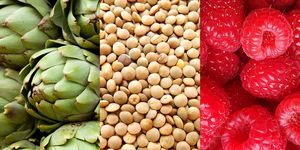
Artichokes are regal-looking veggies that pop up a frequently in salads as they do on cheesy take-out pizza…so how healthy can they be? In short: Pretty darn healthy. “Artichokes have calcium, vitamin C, vitamin A, and iron,” says Kim Kirchherr, R.D..
While many R.D.s recommend eating produce raw to retain as many vitamins and minerals as possible, you can make an exception with artichokes, says Nadja Pinnavaia, Ph.D. and founder of Euphebe Healthcare. Because, as she points out, raw artichokes aren’t exactly palatable.
Whether you choose to steam or boil them, artichokes are a great appetizer, side dish, or snack that pack all kinds of good-for-you perks.
1. They’re full of nutrients.
As Kirchherr mentions above, these little veggies are chock-full of important nutrients, like vitamin C, vitamin A, and iron, “as well as potassium and antioxidants,” she says.
Here’s the full nutrition breakdown of one medium artichoke:
2. They contain a ton of protein.
In addition to its wide nutrition profile,”artichokes offer more protein than many other vegetables at 3.5 grams per serving,” says Kris Sollid, R.D., senior director of nutrition communications at the International Food Information Council Foundation. Bonus: Research from the Journal of the American College of Cardiology found that those who consume a higher ratio of plant-based protein to animal-derived protein have a reduced risk of coronary heart disease.
3. They’re high in fiber.



It’s no secret that fiber helps move your digestion along and keeps you feeling full, but it also offers more long-term benefits like a lower risk of heart disease. According to Sollid, a half cup of artichokes contains about seven grams of fiber, or more than a quarter of the amount recommended for women and nearly a fifth of the amount recommended for men. “Americans only eat about half the amount of fiber that’s recommended per day,” he says, so a serving of artichoke is certainly a step in the right direction.
4. They can strengthen your gut.
Artichokes are full of inulin, according to Sollid, which is a “unique form of fiber known to help prevent gastrointestinal issues like constipation, enhance the absorption of minerals like calcium, and bolster your immune system.”
According to a study from the British Journal of Nutrition, inulin also works as a prebiotic, which helps your body maintain a healthy gut.
5. They may boost your immune system.
Orange juice isn’t the only thing that’ll help keep you from contracting your co-worker’s cold. In fact, the Journal of Agriculture and Food Chemistry ranked artichokes high up on the list of immune-boosting, antioxidant-rich foods.
6. They’re high in polyphenols.
Speaking of a healthy immune system, Pinnavaia says that artichokes are naturally high in polyphenols, which can repair damaged cells that impair your immune function.

Polyphenols are a group of phytochemicals found largely in plant foods that foods that contribute to their color, says Kirchherr. And research from the Journal of Cell Physiology found that they help protect against disease.
7. They can help treat allergies.
According to Pinnavaia, a diet rich in vegetables, like artichokes, has the potential to suppress inflammation.
Sollid says artichokes are an excellent source of folate, which is a B vitamin that researchers have found to be potentially beneficial in reducing inflammation that causes allergies and asthma. It’s also important during pregnancy.
8. They can help lower body fat.
While no food item can single-handedly make you drop pounds, a recent study from Pharmacological Research found that artichokes are certainly helpful in maintaining a healthy bodyweight. “An artichoke has about 25 calories, so it easily fits into a menu that supports healthy weight management,” says Kircherr.
9. They may help reduce the risk of cancer.
In that same vein, reducing inflammation also helps reduce the potential for cancer cell growth, according to Pinnavaia. Artichokes have been shown to help fight a number of specific cancers, too: Their flavonoid content helps kill pancreatic cancer cells, according to a study from Molecular Nutrition and Food Research. And since artichokes are among the highest sources of the flavonoid apigenin (a type of plant nutrient), they can help fight breast cancer, too, according to the Journal of Clinical Biochemistry and Nutrition.
10. They’re a whole food.
A study from the journal Nutrition and Diabetes found that those who adhere to a whole food plant-based diet experience a reduction in cholesterol and body mass index. Sollid makes a case for making whole artichokes part of that plan: “There are unquestioned health benefits to eating a diet that is high in vegetables like artichokes,” he says. “Seeking nutrients from whole foods is always the best approach.”
In case you’re curious, here’s the healthiest way to prep an artichoke:
And voila! You’ve got yourself a healthy snack, appetizer, or side dish. Just try to go light on the butter or mayo dip, and opt for a healthier dip alternative like Greek yogurt with herbs.
Source: Read Full Article